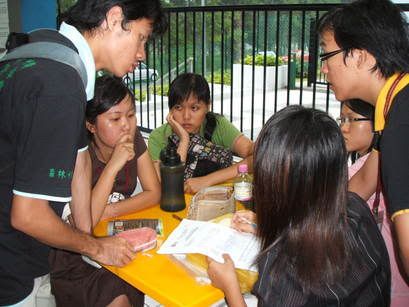 Prepared by: Faridzul Nasaruddin
Prepared by: Faridzul Nasaruddin
On the material date of 25 March 2008 , Malaysian people, in particular universities' and college universities' students had again been given a new fresh hope that the draconian laws embodied in Universities and College Universities Act 1971 (UUCA) will be amended. This had been dictated by the newly-appointed Higher Education's Minister, Dato' Khaled Nordin.
This news had indeed in anyway excited most of the universities students in Malaysia. Although this is not the first time such an utterance has been made since Dato' Musa Mohamad was then the Education Minister, then re-stated by Dato' Mustapha Mohamad which was supported by Datuk Seri Najib, it does not deter the students to refresh their hopes to see the amendment of such laws.
UUCA or more famously known in its bahasa term, AUKU, was passed by Parliament in 1971. The bill of AUKU was firstly presented in the Parliament by Dato' Hussein Onn when he was holding the portfolio of the Education Minister on 17 March 1971. It is important to be noted that the initial objects of proposing and then passing this Act was merely to regulate matters relating to universities' administration. There was no intention by then to create a legal instrument to jeopardize basic human rights guaranteed by the Federal Constitution of Malaysia.
Nevertheless, it is justifiable to say that that original purpose of putting up such an Act was swayed. In 1975, amendment was passed to tighten the Act to the extent of depriving universities' students from participating in social activities and things close to it. And the interesting part to be mentioned here is that the said amendment was agreed by majority of Parliamentarians inclusive of those from the opposition party.
From that moment, this document has been utilised as an effective shield and sword fovourable to the ruling party. It became a great impediment which deprived the students of their supposedly-guaranteed rights to participate actively in social contributions. Students' activism was put in graveyard. They were prohibited of thinking of anything which had no relation to their studies and university's life. Students were then not more of creative and constructive creation.
Section 15 of AUKU had clearly provided that students should not involve in any organizations or associations, be it of social-base, educational-base or political-base, except with the discretion of Vice Chancellor. Apart from that, there are also several other provisions which clearly contravene with provisions in Federal Constitution. Among others are Section 7, Section 8, Section 9, Section 11, Section 12 and Section 16 of AUKU.
Fortunate enough, again in 2008 students were promised with the amendment of AUKU. Although the scope of amendment had not been mentioned, students could possibly be happy when Dato' Khaled said that the amendment is meant to tender more freedoms for the students as to encourage them of creative thinking and unconquered genuine idealism.
Thus, his idea should be supported by all parties. I tend to opine that the students could rely on such promise this time provided that forces and struggles from students themselves must not be ceased. In law of equity, there is a principle of promissory estoppels which could be raised to stop a party who has made a promise (promisor) from reversing his promise which in the event of such reversal will be detrimental to another party (promisee). Although this principle is more commonly benefited in matters relating to land, its comprehension may be used in this case.
Mohd Faridzul Mohammed Nasaruddin
President,
Laws Students' Society,
International Islamic University Malaysia
faridznasar@yahoo.com
www.faridznasar.blogspot.com
NOHHHH... SELINAP DUIT
3 hours ago



0 comments:
Post a Comment